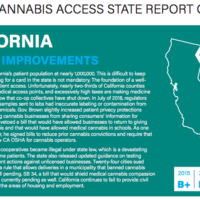UPDATE 10/12/21: LA City Councilmember Raman has introduced a resolution in support of AB 1256. “California has long had a progressive stance on the consumption of cannabis — but it has fallen short in protecting its workers who use cannabis off the job,” said Councilmember Raman. “Each day we neglect removing these outdated drug testing requirements is another day we are erecting roadblocks to ensuring a truly robust and equitable workforce.”
UPDATE JULY 27: The San Francisco Board of Supervisors today unanimously approved a resolution in support of Assembly Bill 1256 by Assembly member Bill Quirk, to prohibit employers from discriminating against potential or current employees who have tested positive for inactive cannabis metabolites in their urine or hair.
The resolution was authored by Supervisor Matt Haney, who issued the statement: “California should lead the way in ending workplace discrimination against responsible, off-the-job cannabis consumers. AB 1256 would add California to the list of over twenty states that have prohibited employers from discriminating against workers on the basis of their legal, off-the job, cannabis use.”
California is behind other states and cities including Nevada, Connecticut, New York, Washington DC, Atlanta, etc., in prohibiting the use of discriminatory drug tests that exclude responsible, off-the-job marijuana users from the workplace.
Last Tuesday, the Board unanimously passed a resolution condemning the suspension of Olympic athlete, Sha’Carri Richardson, due to a positive cannabis test and called on the World and U.S. Anti-Doping Agencies to change their cannabis policies. Supervisors Haney and Shamann Walton authored this important resolution towards cannabis equity.
This week’s resolution to condemn employment discrimination against cannabis consumers is on par with San Fransisco’s long, progressive history of being the leader in cannabis consumer rights. The City of San Francisco first legalized the use of medical marijuana in 1991, when 80% of the city’s residents voted in favor of Proposition P to allow for the permitting of medical cannabis and to protect licensed physicians who recommend it. Proposition P gave San Francisco the title of being the first U.S. city to legalize cannabis.
This year marks the 25th anniversary of the passage of the historic Compassionate Use Act of 1996 (Prop. 215), the nation’s first state law to re-legalize the personal use and cultivation of cannabis for medicinal purposes. Join Cal NORML on Friday, November 5th in San Francisco as we commemorate and celebrate this monumental moment. To register and learn more about the event, please visit us at www.canorml.org/25th215/.
AB 1256 (Quirk) is a Cal NORML-sponsored bill; it has been introduced in the legislature as a two-year bill and will be heard in 2022 as a bill with a new number.

July 26, 2021 – Today, Oakland City Council unanimously approved a resolution in support of Assembly Bill 1256 by Assemblymember Bill Quirk, to prohibit employers from discriminating against potential or current employees who have tested positive for inactive cannabis metabolites in their urine or hair.
The resolution was authored by Vice Mayor Rebecca Kaplan and co-authored by Councilmember Carroll Fife. Vice Mayor Kaplan stated in her support memo:
“Oakland residents and applicants in the City of Oakland should not be punished for usage of legalized cannabis. Employers should only be authorized to dismiss or discipline workers from usage of legalized cannabis when hired, once the applicant is an employee subjugated to workplace politics and conditions of employment. Preventing applicants from being hired for usage of legalized medications and legalized recreational substances places barriers of entry that is discriminatory and negatively impacts applicants from underserved and disadvantaged neighborhoods in the City of Oakland and its surrounding cities.”
When California voters passed Proposition 64 in 2016 to legalize the adult use of cannabis, there were no protections put in place to prevent employment discrimination against cannabis consumers. Assembly Bill 1256 addresses these inequities while still allowing employers to ensure a workforce that is unimpaired on the job.
Urine and hair tests for cannabis don’t detect current impairment, but rather inactive drug residues that stay in the system days and weeks after use. “These tests have nothing to do with workplace safety or job performance,” stated Dale Gieringer, Director of Cal NORML. “There are much better ways to protect workers in safety-sensitive jobs.”
The cities of Atlanta, New York City, Philadelphia, Washington DC, Rochester NY, and Richmond VA have enacted laws protecting employment rights of recreational marijuana users, as have the states of Montana, Nevada, New York, New Jersey and Connecticut. Laws in twenty-one states: Arizona, Arkansas, Connecticut, Delaware, Illinois, Maine, Maryland, Massachusetts, Minnesota, Montana, Nevada, New Jersey, New Mexico, New York, Oklahoma, Pennsylvania, Rhode Island, South Dakota, Vermont, Virginia and West Virginia prohibit employers from discriminating against workers on the basis of their use of medical marijuana.




